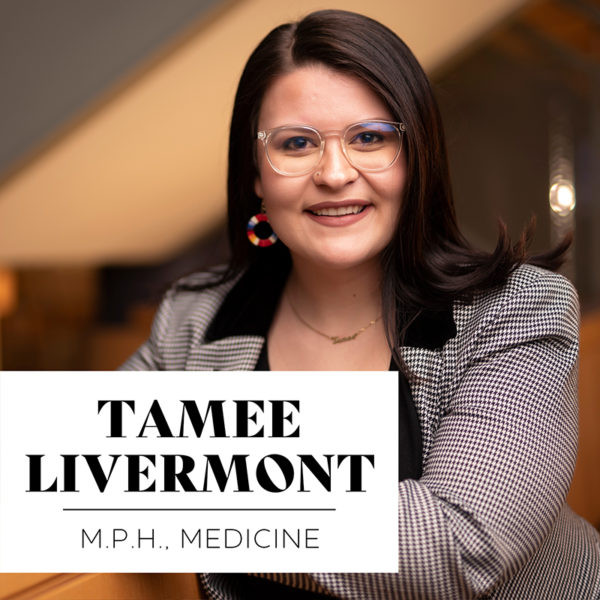By Jalen Blue and Amy Wolf
Tamee Livermont, a master of public health student and citizen of the Oglala Lakota Nation in South Dakota, was eager to begin working as a public health liaison with the Great Plains Tribal Chairman’s Health Board even before completing her studies at Vanderbilt. But just a week after starting her new position, instead of shaping policy, she was directly involved with the fight against COVID-19.
“Never in a million years did I think I would be working on the front lines of helping my community and other tribal communities respond to a pandemic,” says Livermont, whose job involves working with federal, state and tribal partners to increase collaboration on emerging public health needs. “But I absolutely believe I’m in the place where I’m meant to be to make a difference.”
 Livermont says the situation on her reservation is dire, especially since the federal Indian Health Service was already strained before the outbreak. Reservations nationwide face a dramatic lack of testing kits, and many people live in multifamily households, making quarantine challenging.
Livermont says the situation on her reservation is dire, especially since the federal Indian Health Service was already strained before the outbreak. Reservations nationwide face a dramatic lack of testing kits, and many people live in multifamily households, making quarantine challenging.
In response to the challenges brought about by COVID-19, Livermont says many reservations are taking extreme measures. “My tribe is essentially closing the borders and locking down the reservation because that’s all we have right now to slow the spread.”
She is also helping other tribes navigate the often-confusing grant system to try to receive much-needed assistance. “I’m going to do everything I can to work with government leaders to get native people what they need,” she says.
Livermont is ardent about bringing visibility to issues impacting Native American populations, especially around health disparities. During her undergraduate career, Livermont thought becoming a doctor would be the best way she could help improve health for Native American populations. But after discovering a strong interest in policy, she found a new path.
“As a pre-med student, I often thought, ‘What’s the point of treating people if I’m not also helping prevent disease and illness?’ Then I discovered the study of public health policy and thought, ‘Wow, this is really a way to make an impact and remove barriers that are a catalyst to many of the health issues in our communities.’”
After earning a B.A. in Native American studies and a B.S. in medical biology from the University of South Dakota, Livermont decided to pursue her M.P.H. at Vanderbilt. “I had always aspired to attend Vanderbilt,” she says. “When I was applying to programs and got in here, it was kind of a dream come true.”
“I had always aspired to attend Vanderbilt. When I was applying to programs and got in here, it was kind of a dream come true.”
After her first year in the M.P.H. program, Livermont was selected by the Udall Foundation and Native Nations Institute for the 2019 Native American Congressional Internship program in Washington, D.C. One of only 12 students across 10 tribes and 10 universities selected for the program—and the first Vanderbilt student ever to be selected—she completed an internship with the Senate Committee on Health, Education, Labor and Pensions.
While at Vanderbilt, Livermont also has been an advocate for Native American students, faculty and staff. During her final year she was president of Native Americans in Tennessee Interacting at Vanderbilt, a student organization that provides cultural and community support for Native Americans and other indigenous groups represented at the university and in the extended community.
“I hope in some way I can make an impact on health systems,” she says, “as well as the public health infrastructure for my nation, the other tribal nations in South Dakota, and those throughout the Great Plains Region.”